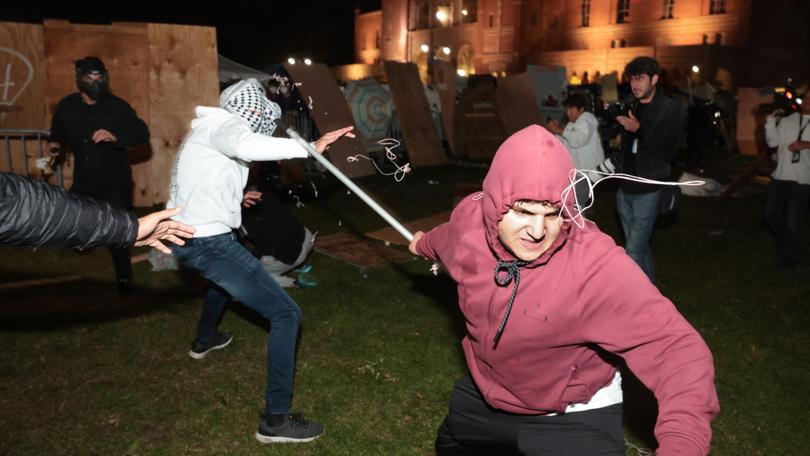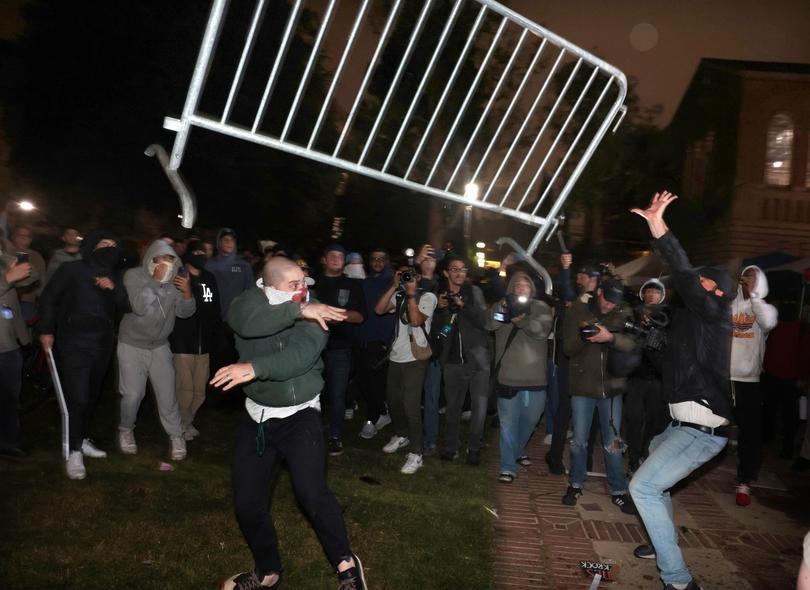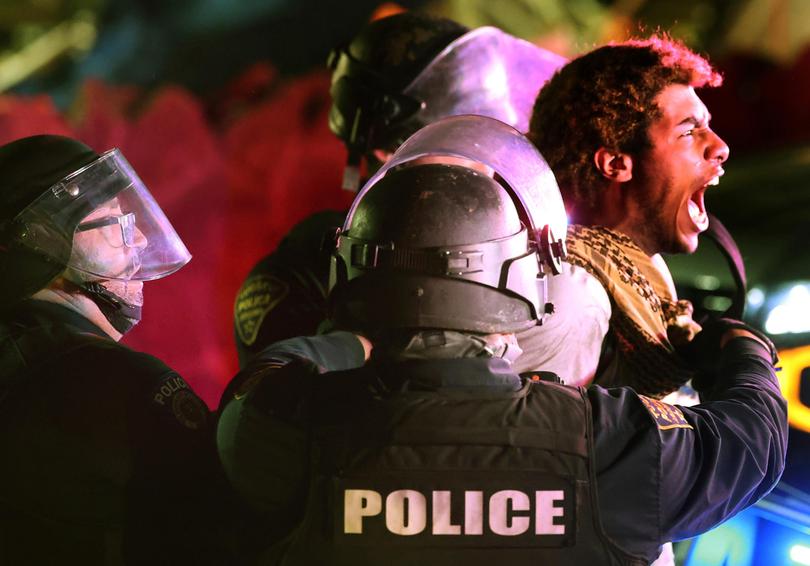Pro-Palestinian demonstrators at UCLA attacked in violent scenes as campus chaos continues to rise across US
Chaotic scenes in California unfolded in the wake of hundreds of arrests being made at an encampment New York’s Columbia University.

Counter-protesters “forcefully” attacked a pro-Palestinian encampment at UCLA early Wednesday, the university’s chancellor said, and activists clashed with police officers who destroyed their tents at the University of Wisconsin in Madison, part of a series of escalating violence on some college campuses over the war in Gaza.
UCLA administrators and campus police delayed intervening and calling for law enforcement backup in the brawl on the Los Angeles campus, prompting widespread condemnation from Muslim students to the city’s mayor to California Gov. Gavin Newsom.
The counter-protesters, some of whom carried Israeli flags, threw traffic cones and chairs, released pepper spray, and pulled down the barricade surrounding the encampment. University officials said 15 people were injured in the confrontation, including one person who was hospitalized.
Sign up to The Nightly's newsletters.
Get the first look at the digital newspaper, curated daily stories and breaking headlines delivered to your inbox.
By continuing you agree to our Terms and Privacy Policy.The chaotic scenes unfolded Wednesday after police burst into a building occupied by anti-war protesters at Columbia University on Tuesday night, breaking up a demonstration that had paralyzed the school.
Chancellor Gene Block at UCLA said in a statement that “a group of instigators“ came on campus Tuesday night to “forcefully attack” the pro-Palestinian encampment.
After a couple of hours of scuffles, police wearing helmets and face shields separated the groups. Later Wednesday, pro-Palestinian protesters rebuilt a barricade around their encampment.
Muslim organizations and students blasted university officials and police in a Wednesday news conference, saying they failed to intervene as students in the pro-Palestinian encampment were verbally harassed, pepper sprayed and beaten.
“The community needs to feel the police are protecting them, not enabling others to harm them,” said Rebecca Husaini, chief of staff for the Muslim Public Affairs Council.
Speakers disputed the university’s account that 15 people were injured and one hospitalized, saying the number of people taken to the hospital was higher. One student described needing to go to the hospital after being hit in the head by an object wielded by counter-protesters.
Several students who spoke during the news conference said they had to rely on each other, not the police, for support as they were attacked, and that many in the pro-Palestinian encampment remained peaceful and did not engage with counter-protesters.
UCLA canceled classes Wednesday.

In Madison, a scrum broke out Wednesday after police with shields removed all but one tent and shoved protesters. Four officers were injured, including a state trooper who was hit in the head with a skateboard, authorities said. More tents sprang up within hours. More than 30 people were initially detained, but police said only four were charged with battering law enforcement.
Tent encampments of protesters calling on universities to stop doing business with Israel or companies that support the war in Gaza have spread across campuses nationwide in a student movement unlike any other this century. The ensuing police crackdowns echoed actions decades ago against a much larger protest movement protesting the Vietnam War.
This is all playing out in an election year in the US, raising questions about whether young voters -- who are critical for Democrats -- will back President Joe Biden’s reelection effort, given his staunch support of Israel.
There have been confrontations with law enforcement and more than 1,300 arrests. In rare instances, university officials and protest leaders struck agreements to restrict the disruption to campus life and upcoming commencement ceremonies.
No arrests have been reported. Officials have not clarified whether the demonstrators were all students.
Block promised the university will conduct a thorough investigation.
“However one feels about the encampment, this attack on our students, faculty and community members was utterly unacceptable,” Block said. “It has shaken our campus to its core.”
UCLA senior Edgar Gomez ventured outside his dorm to watch the ruckus unfold.
“I’ve never seen this happen before,” said Mr Gomez, adding that he isn’t with either group. “I’ve never seen people get so heated.”
Newsom and Los Angeles Mayor Karen Bass both called for accountability of those involved in the melee. A spokesperson for the governor said outside law enforcement was sent to the campus after “unacceptable” delays in the university’s police force response to the clashes.
The nationwide campus demonstrations began at Columbia to protest Israel’s offensive in Gaza after Hamas launched a deadly attack on southern Israel on Oct. 7. Militants killed about 1,200 people, most of them civilians, and took roughly 250 hostages. Vowing to stamp out Hamas, Israel has killed more than 34,000 Palestinians in the Gaza Strip, according to the Health Ministry there.
Late Tuesday, New York City police officers entered Columbia’s campus and cleared a tent encampment, along with Hamilton Hall, where a stream of officers used a ladder to climb through a second-floor window, and police said protesters inside presented no substantial resistance. The demonstrators had seized the Ivy League school building about 20 hours earlier.
Protesters first set up a tent encampment at Columbia almost two weeks ago. The school sent in police to clear the tents the following day, arresting more than 100 people. But the protesters returned.
Negotiations between the protesters and the college ground to a halt in recent days, and the school set a Monday deadline for the activists to abandon the tent encampment or be suspended.
Instead, protesters took over Hamilton Hall early Tuesday, carrying in furniture and metal barricades.
In a letter to senior police officials, Columbia President Nemat Shafik, who uses the first name Minouche, said the administration asked officers to remove protesters “with the utmost regret.”
Columbia on Wednesday called Hamilton Hall “an active crime scene” under NYPD investigation and limited campus access, barring the media.
New York City Mayor Eric Adams blamed “outside agitators” on Wednesday for leading the demonstrations and repeatedly cited the presence of a woman on Columbia’s campus whose husband said had been “convicted for terrorism.” The woman, Nahla Al-Arian, wasn’t on Columbia’s campus this week and isn’t among the protesters who were arrested.
Al-Arian, a retired elementary school teacher, told The Associated Press that Adams misstated both her role in the protests and the facts about her husband, Sami Al-Arian, a prominent Palestinian activist. Nahla Al-Arian said she did go to Columbia for one day on April 25 to see the protest encampment there but left after she got tired.
Blocks away from Columbia, at The City College of New York, video footage showed officers forcing some protesters to the ground late Tuesday and shoving others as they cleared the street and sidewalks.
Close to 300 protesters were arrested in the crackdowns at Columbia and City College, officials said.

Brown University reached an agreement Tuesday with protesters on its Rhode Island campus. Demonstrators closed their encampment after administrators agreed to consider a vote to divest from Israel in October -- apparently the first U.S. college to agree to such a demand.
Meanwhile, protest encampments were cleared by the police, resulting in arrests, or closed up voluntarily at schools across the U.S., including Fordham University in New York, Portland State in Oregon, Northern Arizona University in Flagstaff, Arizona and Tulane University in New Orleans.
Israel and its supporters have branded the university protests antisemitic, while Israel’s critics say it uses those allegations to silence opposition. Although some protesters have been caught on camera making antisemitic remarks or violent threats, organizers of the protests, some of whom are Jewish, say it is a peaceful movement aimed at defending Palestinian rights and protesting the war.
